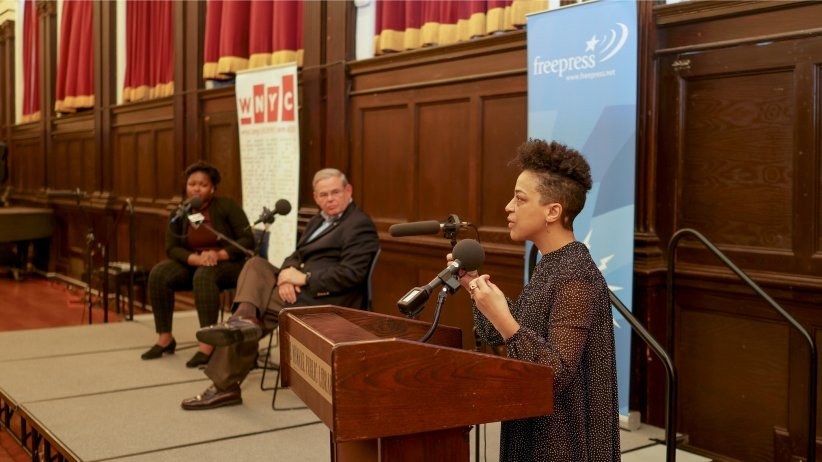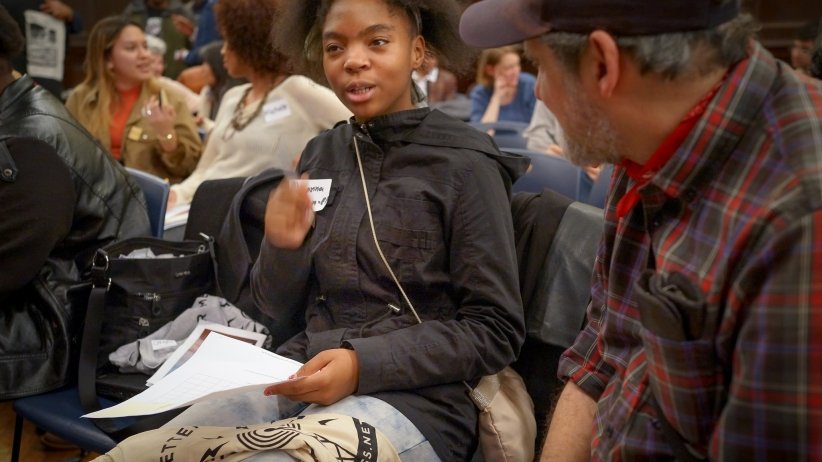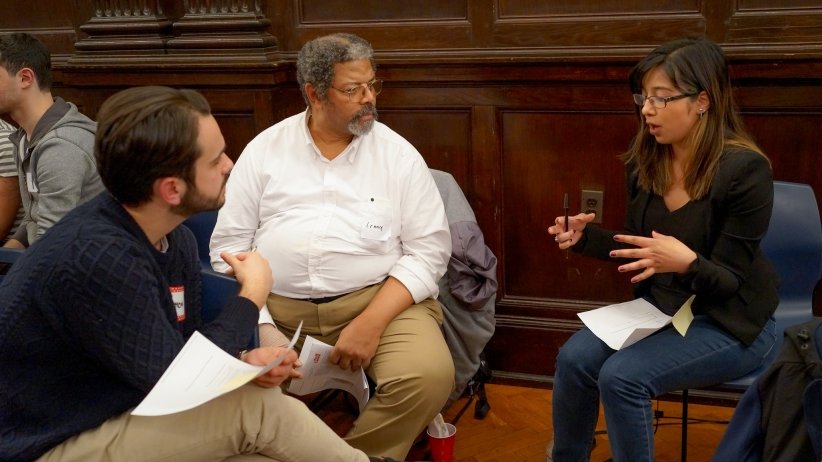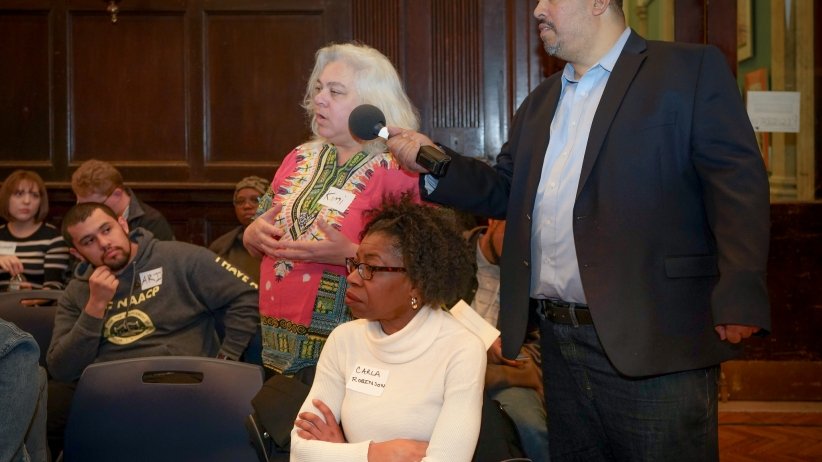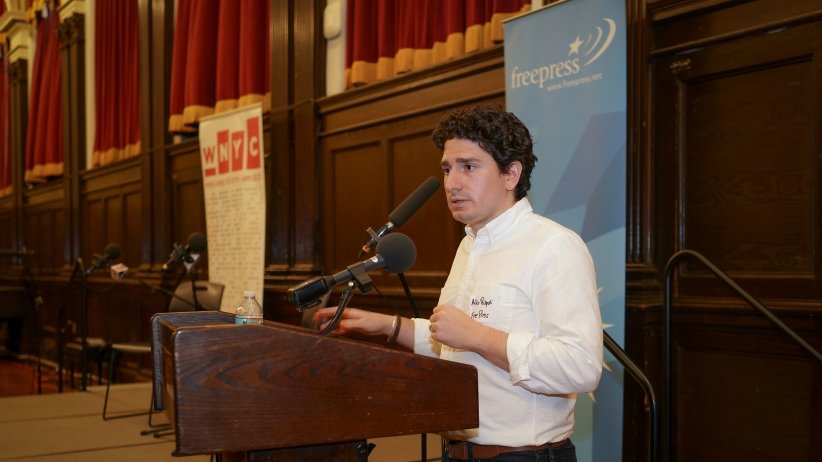Race, the Media and Politics in the Trump Era
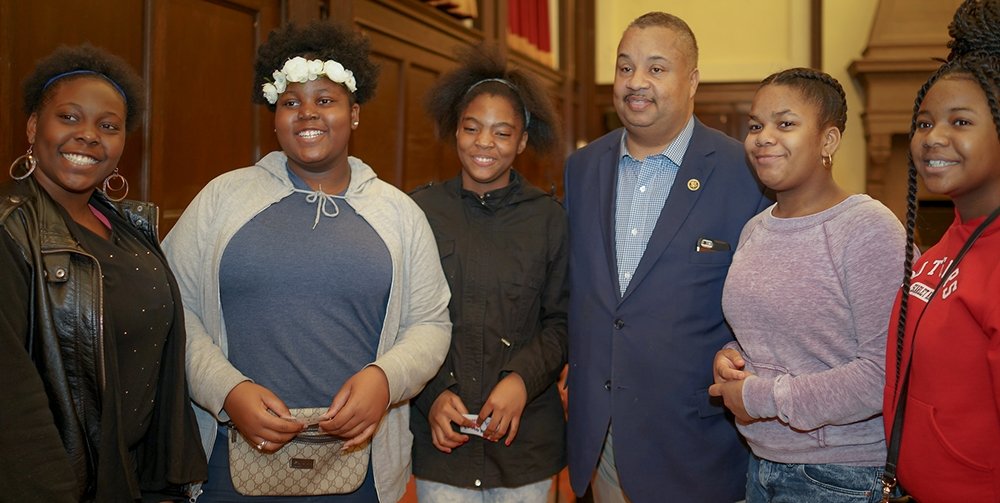
Rep. Donald Payne Jr. with some constituents
Timothy Karr
One of the most important roles news outlets have is their power to convene. They can bring together community members and those in positions of power, and provide a space for thoughtful conversation while asking necessary, but uncomfortable, questions.
Over the weekend, News Voices: New Jersey partnered with WNYC in Newark to connect local leaders, lawmakers, artists and residents to engage in important discussions about race, the media and politics in the Trump era.
More than 150 people came together at the Newark Public Library to have a critical conversation about the ways these issues play out in the city. The discussion took place as thousands were taking action at airports across the country in defense of the rights of refugees and Muslims.
My colleague Mike Rispoli and I started planning this event with WNYC’s Rebecca Carroll last August. But the conversation about race in America has taken on new meaning and urgency over the last 11 days.
We were all there to all listen, share and reflect on what we could do to better understand the impact of systemic and structural racism in America.
The program included three one-on-one conversations covering the American dream, tokenism, black feminism and the women’s marches.
Bringing journalism into the community
Speakers included New Jersey Sen. Robert Menendez; Rep. Donald Payne Jr.; Newark-based poet Paula Neves; local educator, mentor and community organizer A’Dorian Murray-Thomas; gallery owner and activist Jasmine Wahi; and feminist theorist and Rutgers professor Brittney Cooper.
This live event was just one way to bring journalism out of the newsroom and into a community. Instead of having these conversations in a WNYC studio, those speaking could hear from and interact with people in attendance. Instead of people passively listening to “important” people speaking, they could see those figures, ask questions and respond in real time to important ideas.
And — as we do with all of our News Voices events — we invited all those in attendance to host their own conversations. This enabled people to discuss what they heard and think about ways to turn ideas into action.
Here’s a recap and some takeaways from the event:
The American dream
Sen. Menendez and A’Dorian Murray-Thomas shared personal stories about their journeys as members of New Jersey’s Hispanic and Black communities, respectively.
Menendez drew on his experience as a determined high-school student whose teachers failed to take seriously his desire to get into the best schools available.
Murray-Thomas recalled her struggle as a young Black student to overcome racial and cultural barriers to a good education. She spoke of her initiative SHE Wins, which mentors young, disadvantaged girls seeking better educational and career opportunities and more civic engagement.
The focal point to their conversation was that a good education is one of the single most valuable ways to overcome the barriers of structural and systematic racism.
Reflections on the Women’s March
Brittney Cooper and Jasmine Wahi had a candid conversation about the role race played in the recent women’s marches.
Cooper, a respected black feminist theorist, spoke about ongoing tensions between the march’s largely white leadership and black feminists, and the work that needs to be done to unite communities and movements.
Wahi touched on the impact art has on feminism. Her Gateway Project Spaces is a gallery and artist workspace that engages Newark’s creative community in critical dialogues about race and social justice.
Identity politics and tokenism
Rep. Donald Payne Jr. and Luso-American Ironbound poet Paula Neves discussed their experiences with identity politics. In particular, they spoke about what it means to be seen, and how dehumanizing it feels to be unseen.
To illustrate this, Payne told a story about encountering a traffic cop as a young man in Newark.
When he was pulled over, the police officer treated him harshly and threatened to throw him in jail. After Payne handed over his license, the officer changed his tone completely upon realizing that Payne was the son of a distinguished South Ward city councilman.
In a matter of moments, Payne went from being “unseen” as a nameless young Black man to being “seen” as the son of someone in power.
Neves took this idea and spoke about how people choose to see or not see people. For instance, as the child of Portuguese immigrants in Newark, Neves grew up around people of color but was often identified as White.
Q & A, group discussions and next steps
As important as the program itself was the audience, which was racially diverse and included a mix of Newark residents and folks from the broader region.
When we broke into the open-dialogue section of the program, people organized themselves into small groups to talk about what inspired them during the one-on-one conversations — and how to turn that energy into action.
But we weren’t done yet. We asked participants to write down one thing they were taking away from the event, whether it was an idea that moved them or something they wanted to act on.
While leaving, people posted their notes on a wall for all to see. The results were remarkable.
Here are a few of the observations we saw that inspired us:
- Mentoring young people and providing educational opportunities that focus on advancement are needed to help break the cycle of poverty and inequality.
- White people and those in positions of privilege need a better understanding of the struggles that people of color encounter in American society.
- We need to identify structural and systemic racism whenever we see it in our institutions — to call it out and work with policymakers, residents and civic leaders to develop initiatives that measure progress.
- Educating our youth about their culture and their history is essential.
- We need to identify the steps we can take together and the roles each of us can play in highlighting issues that contribute to inequality.
Many attendees expressed interest in participating in more public dialogues. Just as important are the steps local media and News Voices can take to shed light on social justice issues.
Here are a few:
- Raising up the good programs, best practices and actions that can lead to positive change for the residents of Newark
- Pinpointing ways that we can strengthen local media and support independent local journalism
- Forging collaborations between local media and community organizations
- Convening discussions on topics local residents care about
- Educating community leaders and residents on the importance of media literacy and how it can help foster change
Stay tuned for info on upcoming News Voices activities in Newark.
To hear the full audio recording of the event, go here.
Check out the photos from our event below:
